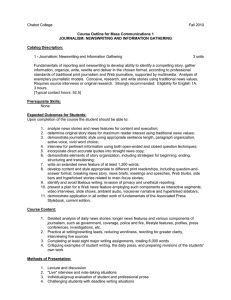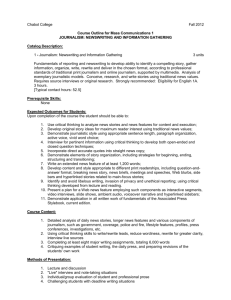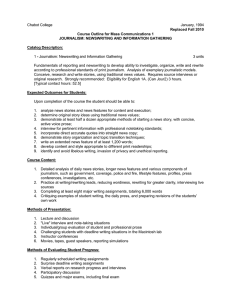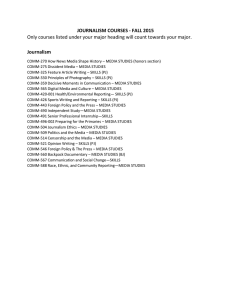JRNAL 120-F12.doc 89KB Feb 18 2014 10:44:42 AM
advertisement
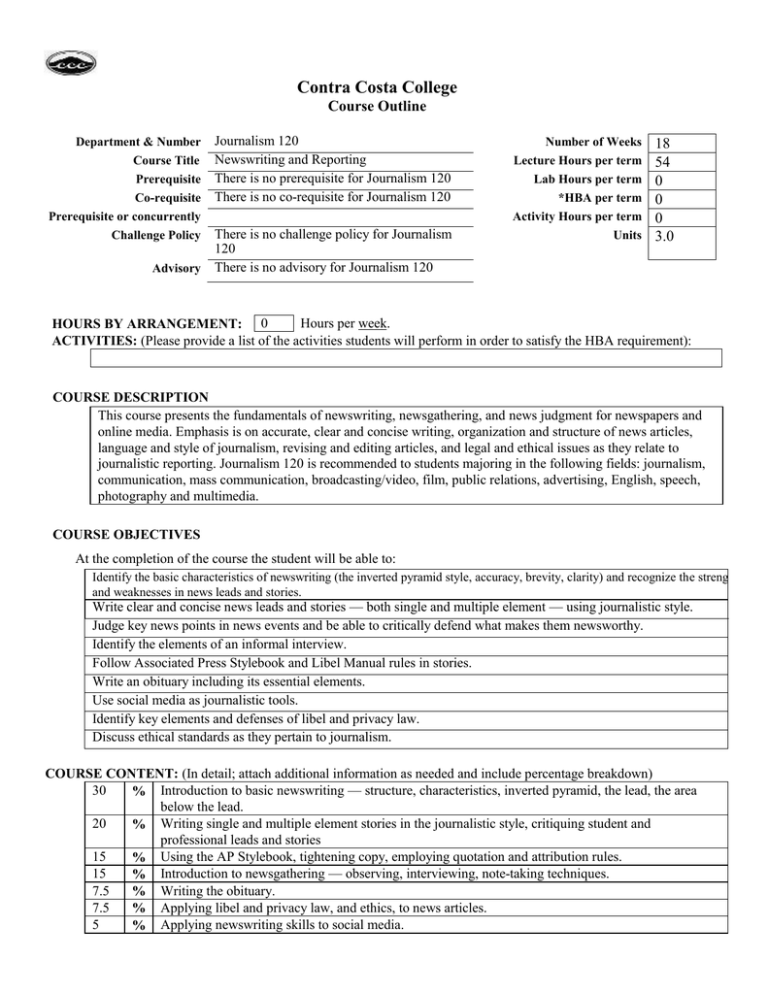
Contra Costa College Course Outline Department & Number Course Title Prerequisite Co-requisite Prerequisite or concurrently Challenge Policy Journalism 120 Newswriting and Reporting There is no prerequisite for Journalism 120 There is no co-requisite for Journalism 120 There is no challenge policy for Journalism 120 Advisory There is no advisory for Journalism 120 Number of Weeks Lecture Hours per term Lab Hours per term *HBA per term Activity Hours per term Units 18 54 0 0 0 3.0 Hours per week. HOURS BY ARRANGEMENT: 0 ACTIVITIES: (Please provide a list of the activities students will perform in order to satisfy the HBA requirement): COURSE DESCRIPTION This course presents the fundamentals of newswriting, newsgathering, and news judgment for newspapers and online media. Emphasis is on accurate, clear and concise writing, organization and structure of news articles, language and style of journalism, revising and editing articles, and legal and ethical issues as they relate to journalistic reporting. Journalism 120 is recommended to students majoring in the following fields: journalism, communication, mass communication, broadcasting/video, film, public relations, advertising, English, speech, photography and multimedia. COURSE OBJECTIVES At the completion of the course the student will be able to: Identify the basic characteristics of newswriting (the inverted pyramid style, accuracy, brevity, clarity) and recognize the strengths and weaknesses in news leads and stories. Write clear and concise news leads and stories — both single and multiple element — using journalistic style. Judge key news points in news events and be able to critically defend what makes them newsworthy. Identify the elements of an informal interview. Follow Associated Press Stylebook and Libel Manual rules in stories. Write an obituary including its essential elements. Use social media as journalistic tools. Identify key elements and defenses of libel and privacy law. Discuss ethical standards as they pertain to journalism. COURSE CONTENT: (In detail; attach additional information as needed and include percentage breakdown) 30 % Introduction to basic newswriting — structure, characteristics, inverted pyramid, the lead, the area below the lead. 20 % Writing single and multiple element stories in the journalistic style, critiquing student and professional leads and stories 15 % Using the AP Stylebook, tightening copy, employing quotation and attribution rules. 15 % Introduction to newsgathering — observing, interviewing, note-taking techniques. 7.5 % Writing the obituary. 7.5 % Applying libel and privacy law, and ethics, to news articles. 5 % Applying newswriting skills to social media. METHODS OF INSTRUCTION Lecture and discussion Instructor and group critiques Conferences and guest speakers INSTRUCTIONAL MATERIALS Instructor generated handouts The Advocate Styleguide, a dictionary Textbook Title: Author: Publisher: Edition/Date: And Supplemental book: Author: Publisher: Edition/Date: Inside Reporting Tim Harrower McGraw Hill ISBN: 978-0-07-337891-6 Latest edition (2010) The Associated Press Stylebook and Briefing on Media Law Associated Press Basic Books 2013 COURSE EXPECTATIONS (Use applicable expectations) Outside of Class Weekly Assignments Weekly Reading Assignments Weekly Writing Assignments Weekly Math Problems Lab or Software Application Assignments Other Performance Assignments Hours per week 1.5 3 0 0 1.5 STUDENT EVALUATION: (Show percentage breakdown for evaluation instruments) 41.5 % Writing assignments 27 % Midterm and quizzes 13.5 % Projects 18 % Final Exam GRADING POLICY (Choose LG, PR/NP, or SC) Letter Grade Pass / No Pass 90% - 100% = A 80% - 89% = B 70% - 79% = C 60% - 69% = D Below 60% = F 70% and above = Pass Below 70% = No Pass Prepared by: Paul DeBolt Date: 04/16/13 X Student Choice 90% - 100% = A 80% - 89% = B 70% - 79% = C 60% - 69% = D Below 60% = F or 70% and above = Pass Below 70% = No Pass
